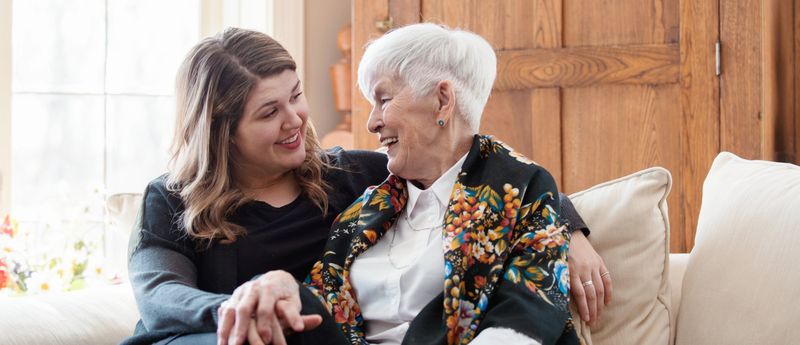16 Hard Truths Parents Need To Accept About Their Adult Children Before It’s Too Late
Parenthood doesn’t end when your children turn 18, but the rules definitely change. Parents must accept that clinging to the past version of their children can cause harm.
Here are 16 hard truths every parent needs to embrace about their adult children, which focus on respect, personal growth, and the evolving nature of familial relationships.
1. They don’t owe you access to every part of their life

A relationship isn’t defined by constant visibility into every nook and cranny of another’s life. Adult children deserve privacy as a hallmark of their maturity and independence. As parents, it’s important to recognize that privacy is not synonymous with rejection. It signifies growth and the need for space to develop their individuality.
Parents might feel shut out or distant, but this isn’t necessarily a sign of disrespect or a lack of love. Instead, it highlights the child’s progress in carving out their own identity. In respecting their need for privacy, parents show trust and support for their adult children’s journey.
Remember, just as you once needed space to evolve, your children now require the same. Embrace open, respectful communication to nurture a relationship built on mutual understanding rather than constant access.
2. You’re not entitled to their time just because you’re their parent

Time is a precious commodity, and adult children juggle many responsibilities, from careers to personal relationships. As a parent, it’s crucial to respect their autonomy in how they spend their time. Your relationship can thrive on quality, not quantity.
Demanding time based on parental entitlement can strain your relationship. Instead, express a desire to connect without making your child feel obligated or guilty. Appreciating their time and efforts fosters a more meaningful connection.
Be open to changing dynamics. Your child’s busy schedule doesn’t lessen their love for you. Supporting their independence while cherishing spent moments together strengthens your bond. Remember, mutual respect is key in maintaining a healthy parent-child relationship.
3. They may love you deeply and still keep boundaries

Love doesn’t automatically grant unlimited access. Adult children can love their parents deeply while maintaining healthy boundaries. Establishing boundaries is an act of self-care, not an indication of emotional distance.
Respect these boundaries as a testament to your child’s maturity and their respect for the relationship’s health. It demonstrates an understanding that relationships thrive when each individual has space to breathe and evolve.
Recognize these boundaries as opportunities to grow together. Engage in open dialogue to understand their needs better, fostering trust and mutual respect. Love with boundaries can be immensely fulfilling, offering both parties the freedom to be themselves.
4. They don’t have to follow your blueprint for happiness

Each person’s journey to happiness is unique. Adult children are not extensions of their parents, destined to follow predetermined paths. Allow them the freedom to design their own lives, even if it diverges from your vision.
Your blueprint was born from your experiences and dreams, but your child’s happiness may lie in a different direction. Encouraging them to pursue their own ambitions shows love and respect for their individuality.
Celebrate their milestones, even if they differ from traditional expectations. Supporting their choices strengthens your relationship. Embrace the diversity in their path, knowing that their joy is what truly matters.
5. They’re allowed to have political, spiritual, or social beliefs you don’t agree with

Diverse beliefs are part of what makes a person unique. Your adult children may hold political, spiritual, or social views different from yours. Rather than seeing these differences as conflicts, view them as chances for enriching dialogue.
Acknowledging and respecting their beliefs doesn’t mean you have to agree, but it fosters a more open, loving relationship. Engage in conversations that allow both parties to express their views without judgment.
Remember, disagreement isn’t disrespect. It’s a testament to your child’s growth and their ability to think independently. Embrace these differences and encourage them to explore their own truths.
6. They might not parent the way you did—and that’s okay

Parenting evolves with each generation. Your adult children may embrace different parenting philosophies, reflecting the changing world they live in. Instead of judging, consider the wisdom they bring from new perspectives.
Different doesn’t equate to wrong. Support their choices and offer guidance only when asked. This approach respects their role as parents and acknowledges their ability to make informed decisions.
Celebrate their parenting journey. Each generation adapts to its unique challenges, and your support can make their path smoother. Embrace their growth as parents with love and pride.
7. They’re not your second chance at the life you wanted

Adult children are not vessels for unfulfilled dreams. They deserve to pursue their passions, not carry the burden of parental aspirations. While it’s natural to have hopes for your children, imposing them can lead to resentment.
Support their individual journeys, understanding that their path is theirs alone. Encourage them to explore what truly makes them happy, free from the shadows of your desires.
Cherish their accomplishments, knowing that their success is defined by their terms. Celebrate the person they are becoming, independent and true to themselves. Let them live their life authentically.
8. You don’t get to use “I’m your parent” to override their choices

Authority doesn’t equate to control. Adult children navigate their own lives, making choices guided by their values and experiences. The phrase “I’m your parent” shouldn’t be wielded to undermine their autonomy.
Trust their ability to make decisions, even if they differ from what you would choose. Supporting their independence demonstrates respect for their maturity and judgment.
Open, honest communication fosters understanding. Discuss concerns without imposing your will, allowing for a relationship based on mutual respect. This approach strengthens bonds and encourages personal growth.
9. They may distance themselves from you to heal

Distance can be a powerful tool for healing. Sometimes, adult children need space to process past hurts or establish healthier boundaries. This distancing isn’t an act of spite but rather a step towards survival and personal growth.
Respect their need for space and use this time for self-reflection. Consider how your actions may have contributed to their need for distance and what changes could support a healthier relationship.
In time, healing can bring about a stronger bond, built on understanding and respect. Support their journey by being patient and open to change.
10. You don’t get to dictate their relationship with siblings or extended family

Each relationship is unique, and adult children have the right to navigate theirs without external influence. As parents, stepping back allows them to form genuine bonds based on their experiences and feelings.
Avoid dictating how they should interact with siblings or extended family. Trust their ability to manage these relationships, understanding that each bond is personal.
Encourage open communication and support their choices, even if they differ from what you envisioned. Respect for their autonomy fosters a more harmonious family dynamic.
11. You can’t expect them to meet your emotional needs

Adult children are not responsible for fulfilling their parents’ emotional voids. This expectation can burden them and strain the relationship. Parents should seek support from peers or professionals to address unmet emotional needs.
Encourage independence in emotional well-being for both yourself and your child. This separation fosters a healthier and more balanced parent-child dynamic.
Building connections with others and nurturing self-care practices can enhance your emotional health. This approach allows your relationship with your child to flourish, free from undue emotional pressures.
12. You don’t automatically deserve forgiveness for past harm

Forgiveness isn’t a guarantee; it’s a journey. Adult children may grapple with past wounds, needing time and space to heal. Understanding this process helps move towards a healthier relationship.
Acknowledging past mistakes and showing genuine remorse can facilitate healing. Being patient and respectful of their timeline demonstrates maturity and empathy.
Work towards creating new, positive experiences together. This effort shows your willingness to grow and change, paving the way for potential forgiveness in the future.
13. They may not share your definition of “success”

Success is subjective. Adult children may measure it differently, valuing happiness and fulfillment over traditional markers like wealth or status. Recognizing this broadens your perspective and strengthens your relationship.
Celebrate their achievements, no matter how unconventional. Their happiness and satisfaction are true indicators of success.
Support their journey, understanding that success isn’t a one-size-fits-all concept. Embrace their choices and be proud of their unique accomplishments.
14. You can love someone deeply and still need to unlearn toxic parenting patterns

Love is a powerful motivator for change. Acknowledging the need to unlearn toxic patterns is a brave step towards a healthier relationship. Recognize that habits from the past may not serve your child’s best interests today.
Commit to growth by educating yourself on new parenting approaches. This effort shows your dedication to a nurturing relationship based on mutual respect and understanding.
Embrace change as a positive evolution of your relationship. Love isn’t just about holding on; it’s about growing together in healthier ways.
15. Their home, parenting style, and lifestyle choices are not up for debate

Every adult child deserves the freedom to create a life that reflects who they are. Their choices in home, parenting, and lifestyle are personal and not subject to parental approval.
Respecting these choices means accepting them without judgment. Your support can greatly impact their confidence and happiness.
Celebrate their individuality and creativity. Encouraging them to thrive in their environment solidifies your bond and showcases your unconditional love.
16. The best way to stay close is to honor who they are now—not who they used to be

To maintain a close relationship, celebrate your adult child’s present self rather than clinging to the past. Embrace their evolution with an open heart and mind.
Recognize their growth and support their journey, acknowledging the person they have become. This acceptance fosters a deeper, more meaningful connection.
Cherish shared moments and create new memories together. Honoring their current identity strengthens your bond and demonstrates genuine love and respect.







